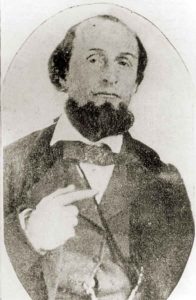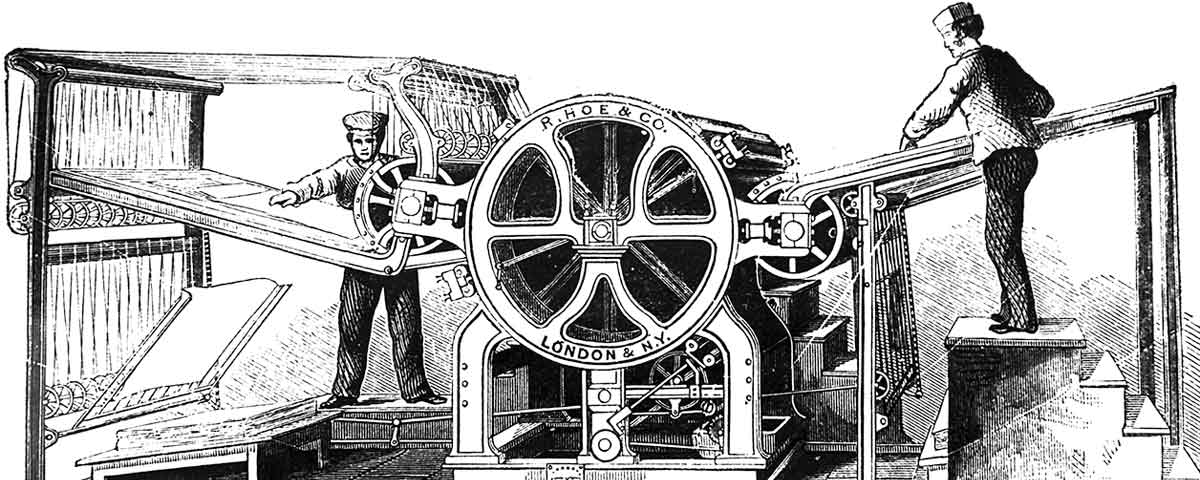America’s history has been frequently marked by contentious relations between the government and the press. Nothing, however, compares with the saga of the Memphis Daily Appeal, initially a local Tennessee newspaper that so strongly supported the Confederacy its staff was forced to move from city to city, hauling along a printing press, one step ahead of Union Army pursuers.
The newspaper made its appearance as the Memphis Appeal in 1841, the only Democratic newspaper in a near-total Whig community. When it became a daily paper six years later, its founder, Henry Van Pelt, changed its name to the Memphis Daily Appeal. Van Pelt died in early 1851, and the running of the paper fell to editor Benjamin Dill, his wife Caroline, and John Reid McClanahan, its owner/printer. They would soon prove themselves a formidable team, with McClanahan the most visible of the three.
John R. McClanahan was a larger-than-life presence—tall, broad-shouldered, and irrepressible. He was a scrapper, charmer, and skillful wordsmith, given to heavy drinking and the company of prostitutes. And by the end of the Civil War, he was running from the armies of three Union generals.
From the beginning, the paper came out strongly on behalf of states’ rights, and by the time of the firing on Fort Sumter its columns blazed with scathing editorials championing secession and the newly formed Confederacy. Reflecting the tone of the times, the often-sensationalist writing bolstered support for the South. One biographer described McClanahan’s style as “Southern contemporary,” explaining that he grew up “in the age of the golden-throated, windy orator[s] who took two or three hours to make a point….[F]rom them, McClanahan learned [to use] loaded diction chosen with an ear to sonority and dramatic effect.”
During the first year of the war, McClanahan more than doubled the paper’s size and filled its pages with news and editorials, based on information provided by numerous field correspondents. However, on June 6, 1862—with Union gunboats threatening the city—Memphis surrendered, placing the Dills and McClanahan in a precarious position. As elsewhere, the Yankees were censoring or closing down the city’s papers, and rather than lose the Appeal, the trio and their staff caught a southbound train.

They took their entire print shop with them, including the printing press, a huge (8-foot-high by 5-foot-wide by 12-foot-long) steam-powered high-speed rotary affair made by the famous R. Hoe and Co., and referred to familiarly as the “Hoe.” The press had to be taken apart—a tedious job requiring three men—and shipped in multiple boxcars. It was the newspaper’s first such move; it would not be the last.
The fugitives traveled as far as Grenada, Miss., where they immediately printed their next issue. The editorial read in part, “So long as two or three States are gathered together in the name of the Confederate States, so long will we be found advocating, as zealously as ever, a continued resistance to the tyranny which a haughty foe are endeavoring to establish over us….”
The Grenada stay was fated to be short-lived. On November 29, Union forces under Maj. Gen. Ulysses S. Grant made their way toward the city, whereupon the Appeal staff hauled its press, along with the type, boilers, and engines, to Jackson by wagon. There, over his hotel room door, McClanahan boldly hung the sign, “Memphis Headquarters.”
Again, the paper’s tenure was limited, as Grant and Maj. Gen. William T. Sherman closed in on Jackson in May 1863. Sherman despised newspapers and reporters in general, and now, specifically, the Memphis Daily Appeal. Capture would have doubtless meant the end of the paper. As McClanahan said in an understatement, “We knew that nothing derogatory to the Lincoln government would be allowed to appear….”
This time, the staff loaded the press and related items onto a flatboat, barely ahead of the Yankees, and poled down the river to Meridian, Miss. Somewhere in the course of their wanderings, the paper had acquired the epithet the “Moving Appeal.” The name suited it well. It was also known to Southerners as “the Bible of the Confederacy,” and “The Greatest Rebel of Them All.” To the Yankees, however—although many of them read it for its up-to-date articles—it was “that damned Reb rag” and the “hornets’ nest of the Rebellion.” And to Union generals, McClanahan was “the old fox.”
The stay in Meridian was brief as well. A year to the day after Memphis’ surrender, the newspapermen and their heavy responsibility arrived in Atlanta. For one year, the Appeal enjoyed widespread popularity, its circulation rising to around 15,000. Writes one chronicler, “the ‘pass-along’ rate…could well have been over 30 per copy before handling and the weather crumbled the paper stock.”
By June 1864, however, Atlanta had come under Union attack. The newspaper office endured weeks of brutal shelling, and members of McClanahan’s company also manned weapons and served on the city’s ramparts until the Yankees entered the town. The paper’s staff then dragged the press to the former Confederate capital of Montgomery, Ala.
Conditions in the South were growing progressively worse. Still, the crew of the Appeal turned out the news, keeping the presses running even after Robert E. Lee surrendered the Army of Northern Virginia on April 9, 1865. Then, in an effort to escape Brig. Gen. James H. Wilson’s cavalry, staffers made their last move, to Columbus, Ga., where they were finally captured on April 16. Before that, however, they hid the Hoe press, to be recovered and used when peace had been restored.
After the war, the Appeal’s presses rolled again in Memphis. Caroline Dill ably ran the paper for decades after the deaths of her husband and McClanahan. Today, the newspaper survives in Memphis as the Commercial Appeal, with a circulation of about 134,000.
Throughout the conflict, the “Moving Appeal” was much beloved and relied upon by Southern soldiers and civilians alike. Decades after the war had ended, historian R.A. Halley wrote:
“With an enterprise and pluck that met obstacles only to overcome them, its proprietors moved…from place to place, and whether staying for a month or a year were prompt in issuing a daily paper that was edited with skill and ability and was one of the greatest of useful agencies in the life of the Confederacy. Its correspondents were found with every army in every State….It was a tower of strength to the Southern people….[A]ltogether it makes a story unsurpassed if not unequalled in the annals of journalism.”
Ron Soodalter writes from Cold Spring, N.Y.





